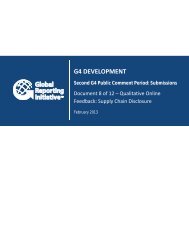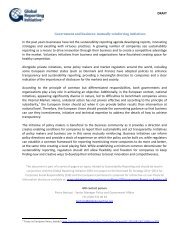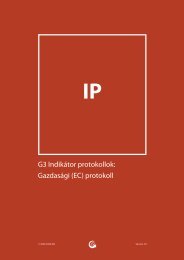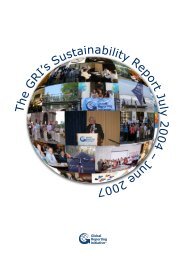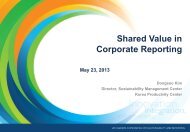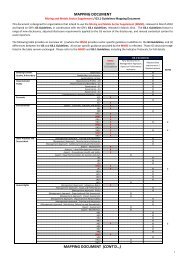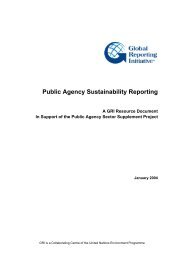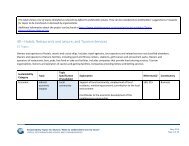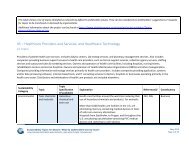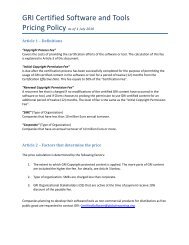Electric Utilities Sector Supplement - Global Reporting Initiative
Electric Utilities Sector Supplement - Global Reporting Initiative
Electric Utilities Sector Supplement - Global Reporting Initiative
You also want an ePaper? Increase the reach of your titles
YUMPU automatically turns print PDFs into web optimized ePapers that Google loves.
RG<br />
&<br />
EUSS<br />
Sustainability <strong>Reporting</strong> Guidelines & <strong>Electric</strong> Utility <strong>Sector</strong> <strong>Supplement</strong><br />
EU<br />
Stakeholder Inclusiveness<br />
Definition: The reporting organization should identify<br />
its stakeholders and explain in the report how it has<br />
responded to their reasonable expectations and interests.<br />
Explanation: Stakeholders are defined as entities or<br />
individuals that can reasonably be expected to be<br />
significantly affected by the organization’s activities,<br />
products, and/or services; and whose actions can<br />
reasonably be expected to affect the ability of the<br />
organization to successfully implement its strategies<br />
and achieve its objectives. This includes entities or<br />
individuals whose rights under law or international<br />
conventions provide them with legitimate claims vis-àvis<br />
the organization.<br />
Stakeholders can include those who are invested in the<br />
organization (e.g., employees, shareholders, suppliers) as<br />
well as those who are external to the organization (e.g.,<br />
communities).<br />
The reasonable expectations and interests of<br />
stakeholders are a key reference point for many<br />
decisions in the preparation of a report, such as<br />
the scope, boundary, application of Indicators,<br />
and assurance approach. However, not all of an<br />
organization’s stakeholders will use the report. This<br />
presents challenges in balancing the specific interests/<br />
expectations of stakeholders who can reasonably be<br />
expected to use the report with broader expectations of<br />
accountability to all stakeholders.<br />
For some decisions, such as the report scope or<br />
boundary of a report, the reasonable expectations and<br />
interests of a wide range of stakeholder will need to be<br />
considered. There may be, for example, stakeholders<br />
who are unable to articulate their views on a report<br />
and whose concerns are presented by proxies. There<br />
may also be stakeholders who choose not to express<br />
views on reports because they rely on different means<br />
of communication and engagement. The reasonable<br />
expectations and interests of these stakeholders should<br />
still be acknowledged in decisions about the content<br />
of the report. However, other decisions, such as the<br />
level of detail required to be useful to stakeholders, or<br />
expectations of different stakeholders about what is<br />
required to achieve clarity, may require greater emphasis<br />
on those who can reasonably be expected to use the<br />
report. It is important to document the processes and<br />
approach taken in making these decisions.<br />
Stakeholder engagement processes can serve as tools<br />
for understanding the reasonable expectations and<br />
interests of stakeholders. Organizations typically initiate<br />
different types of stakeholder engagement as part of<br />
their regular activities, which can provide useful inputs for<br />
decisions on reporting. These may include, for example,<br />
stakeholder engagement for the purpose of compliance<br />
with internationally-agreed standards, or informing<br />
ongoing organizational/ business processes. In addition,<br />
stakeholder engagement may also be implemented<br />
specifically to inform the report preparation process.<br />
Organizations can also use other means such as the<br />
media, the scientific community, or collaborative activities<br />
with peers and stakeholders. These means can help the<br />
organization better understand stakeholders’ reasonable<br />
expectations and interests.<br />
For a report to be assurable, the process of stakeholder<br />
engagement should be documented. When stakeholder<br />
engagement processes are used for reporting purposes,<br />
they should be based on systematic or generallyaccepted<br />
approaches, methodologies, or principles.<br />
The overall approach should be sufficiently effective<br />
to ensure that stakeholders’ information needs are<br />
properly understood. The reporting organization should<br />
document its approach for defining which stakeholders<br />
it engaged with, how and when it engaged with them,<br />
and how engagement has influenced the report content<br />
and the organization’s sustainability activities. These<br />
processes should be capable of identifying direct input<br />
from stakeholders as well as legitimately established<br />
societal expectations. An organization may encounter<br />
conflicting views or differing expectations among its<br />
stakeholders, and will need to be able to explain how it<br />
balanced these in reaching its reporting decisions.<br />
Failure to identify and engage with stakeholders is<br />
likely to result in reports that are not suitable, and<br />
therefore not fully credible, to all stakeholders. In<br />
contrast, systematic stakeholder engagement enhances<br />
stakeholder receptivity and the usefulness of the<br />
report. Executed properly, it is likely to result in ongoing<br />
learning within the organization and by external<br />
parties, as well as increase accountability to a range of<br />
stakeholders. Accountability strengthens trust between<br />
the reporting organization and its stakeholders.<br />
Trust, in turn, fortifies report credibility.<br />
20<br />
© 2000-2009 GRI





